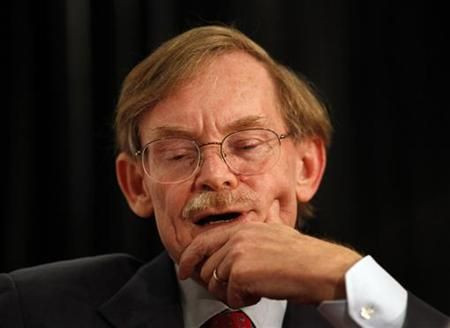World Bank Chief: Nations Must Tackle Global Debt Mess

The World Bank chief Tuesday called on national governments to seek long-term debt curbs to solve the current sovereign debt crises in Europe and the United States, but said it was too early for special action by the Group of 20 nations.
World Bank President Robert Zoellick also said it was time to push a free trade agenda, warning against rising protectionism.
"This is really at a stage where you still have sovereign governments having to make decisions in Europe," he told reporters in the Australian capital Canberra.
"It really is going to be the responsibility of each of those sovereign entities to make the calls on how they are going to face not only the short-term challenges, often assisted by their central banks, but also go to the medium and long term," he said.
Euro zone policymakers have been battling to contain a debt crisis that threatens to enter a dangerous new phase by engulfing larger nations on the region's periphery, with the European Central Bank stepping in last week to buy Italian and Spanish bonds in a bid to calm nervous markets.
But the idea of joint "Eurobonds" has been fiercely opposed by Berlin, which is fearful such a step would push up German borrowing costs and reduce incentives for weaker euro zone members like Greece to reform their economies.
FIN MINISTERS CALL FOR POLITICAL RESOLVE
Zoellick's comments came as finance ministers of five nations - Canada, Britain, South Africa, Singapore and Australia - wrote a joint article to urge global action to restore confidence and for governments to do more to restore finances.
The ministers also said more political resolve was needed to strengthen bank balance sheets.
"Credible fiscal plans and stronger banks must be matched by more progress on global rebalancing," the ministers wrote in an article published in the Financial Times.
"In any coordinated global effort, all countries must make their contribution. Surplus countries and leading emerging economies have to keep up the momentum of structural reforms that support domestic consumption and global demand. A slowdown in these reforms at a time of decelerating global growth risks adding to the spiral of global decline."
Members of the G7 group of leading industrial powers promised Aug. 7 to take whatever action was needed to steady global financial markets, including joint action in foreign exchange markets.
Finance ministers and central bankers from the G20 have also promised to take all steps necessary, in a coordinated way, to support financial stability and foster economic growth.
After meetings with Australian Treasurer Wayne Swan and Prime Minister Julia Gillard in Canberra, Zoellick said the loss of market confidence in economic leadership the United States and Europe, coupled with a fragile economic recovery, had pushed markets into a new danger zone.
"What markets are looking to is a long-term action plan that goes beyond discretionary spending," he said of the United States. "So far, we've been able to kind of hold off the dogs of protectionism, but as you get slowdown, these risks can build."
European banks were rocked last week by concern about a squeeze for short-term funding, with tougher and more costly financing and a retreat by U.S. money market funds prompting lenders to turn to the ECB for more cash. France's banks were hit particularly hard.
Zoellick said the appreciation of China's yuan currency would be a positive in helping restore global economic stability and tackling China's inflation.
"That could help deal with some of the inflation rate and is also a contributer, I think, to some of the stability in the international system," he said.
© Copyright Thomson Reuters {{Year}}. All rights reserved.





















